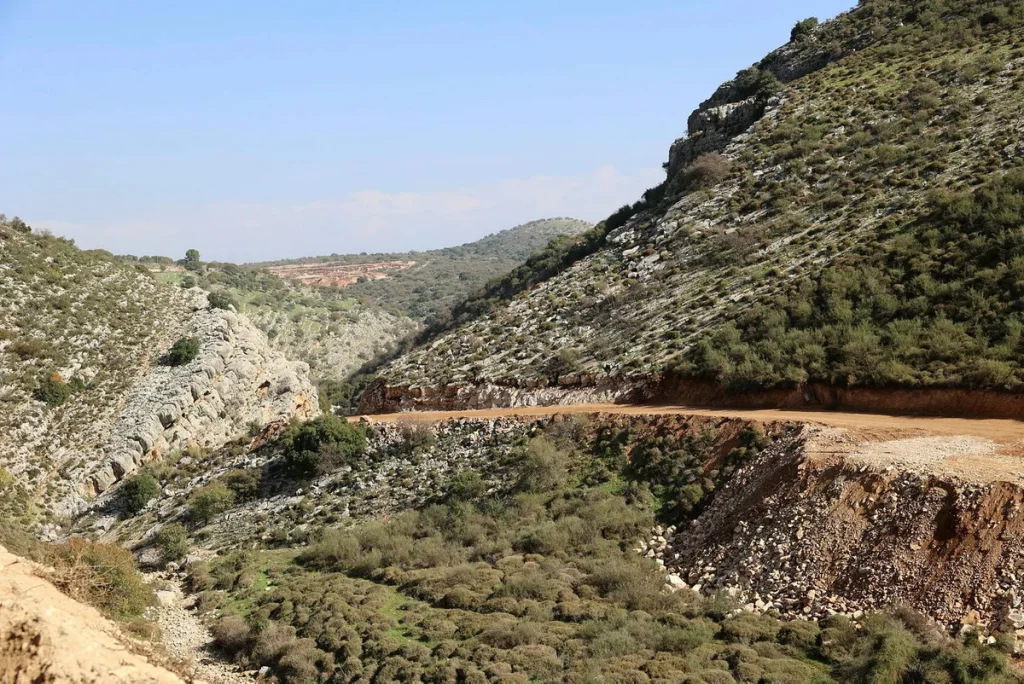As the Israeli army prepares for fighting Hezbollah in the north, it breaks new roads for tanks at the landscape’s expense. Battles with Hamas in the south have caused fires in several nature reserves, and stray dogs wandering across the border raise fears of disease epidemics
Zafrir Rinat. Feb 13, 2024
Since Israel’s war with Hamas broke out, military activity has caused environmental damage in the Lebanon and Gaza border areas.
According to Israel’s Nature and Parks Authority, the damage is caused, among other things, by breaking new tank roads inside nature reserves in the north, a move intended to improve the military’s ability to combat Hezbollah, which involves extensive ground excavating and waste pollution.
The environmental impact of the war is also evident in the south, where battles with Hamas leave scorched land, and set fires in several nature reserves. Meanwhile, many stray dogs wander into Israel from the Gaza Strip, prompting fears about disease epidemics.
According to a Nature and Parks Authority briefing on Monday, the army’s preparations on the Lebanon border include breaking multiple new roads to allow forces to pass through gorges without being exposed to Hezbollah fire. This move severely damaged nearby rivers such as Dishon and Aviv.

Another new road there, which the military began building without consulting the Nature and Parks Authority, badly damaged a rare concentration of protected trees.
In the same area, the army began paving a wide road after a tank almost overturned while attempting to cross the existing route. The roadworks involve excavating the ground and constructing earth levees, which destroy the landscape. Heavy military vehicle activity also damaged the Birket Man natural pool on the Hermon ridge, too.
“I am very concerned about the extent of the damage to nature in the north,” said Raya Shurki, CEO of Israel’s Nature and Parks Authority. “We don’t know its full scope yet, since there are areas that the army has closed off, and we have not been able to reach.”
The Nature Authority noted that coordination with the army has improved over time, but the damage continues due to the nature of military activity. The Authority’s inspectors can only try presenting less destructive alternatives.
“This type of ground is harder to repair damages on,” said Dr. Yehoshua Shkedi, Chief Scientist at the Parks and Nature Authority. “Harder, that is, than the sand and kurkar lands in the Gaza border area.”

Military forces deployment created sites of quarrying and landworks debris, as well as large amounts of garbage left by soldiers in the area. This latter issue is also evident on a large scale in meeting and military preparedness zones around the Gaza Strip. However, the Authority reports that the army has improved its waste treatment recently.
On the southern front, several nature reserves have seen fires since the fighting began, including Karmiyya and Zikim. In the Zikim dunes, a fire broke out as a result of gunfire in a battle with terrorists. The fire caused extensive damage to the reserve’s flora. In the Karmiyya Reservation, mature trees were damaged by direct hits from rockets fired from the Gaza Strip.
Since the battle began on the southern front, multiple fires have broken out in various nature reserves In the Zikim dunes, a fire broke out as a result of gunfire during a battle with terrorists. The fire caused significant damage to the reserve’s flora. Direct impacts from rockets fired from the Gaza Strip damaged mature trees on the Karmiyya Reservation.Open gallery view

Another indirect but evident effect of the war on the environment is the influx of stray dogs from the Gaza Strip into Israel, which may spread rabies and devour wild animals.
Kobi Sofer, a Nature and Parks Authority inspector in the northern Gaza border zone, estimates that at least a thousand dogs have entered Israel through this area alone. He says there have been reports of dogs trying to hunt deer, and of packs of dogs attacking soldiers. The dogs also raid the cowsheds, devouring calves, sheep, and goats.
To put an end to these phenomena, the Nature and Parks Authority seeks to broaden its jurisdiction to shoot stray dogs, which is currently limited to nature reserves.
“Most of the damage to nature can be restored and we have the knowledge and expertise to do so,” Shkedi said. “What we find worrying is what will happen after the war, when the army starts redeploying. It will build infrastructure and army bases, including additional roads and groundwork.
“It also means that more lighting, noise, electricity, and water infrastructure will be built in natural areas. We are planning for widespread devastation to open areas, as well as significant expansion of existing towns,” Shkedi said.
The army has already begun construction on several posts along the Gaza perimeter. Although the construction is being carried out in coordination with the Nature Authority, it involves harming some natural areas.
The Israeli Defense Forces said in response: “From the beginning of the war, the IDF has been working in full coordination and cooperation with all the relevant authorities, in order to fulfill its defense missions and ensure the security of the citizens, while reducing the damage to the State of Israel’s natural landscape and heritage. The IDF sees great importance in protecting the environment and will continue to act as much as possible to reduce the damage to it.\
